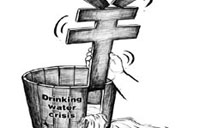Water demands of future can be met if steps taken now, experts say
By CANG WEI (chinadaily.com.cn) Updated: 2014-10-16 21:15Water resource experts in China said that the country's water needs can be met in the future if necessary steps are taken and examples learned from other countries.
 |
Lu Mai, secretary-general of the China Development Research Foundation, said that if the country reduces water leakage and improves water-use efficiency, there will be enough water for China's agriculture, industry and people's daily lives.
According to Lu, two-thirds of Chinese cities lack enough water, and the country's per-capita quantity of water resources is only one-fourth of the world average.
"China's rapid urbanization and industrialization have made the situation even worse," said Lu. "Many factories pouring untreated sewage choose to relocate to remote areas to avoid monitoring, and they usually locate in the upstream stretches of the rivers. Over-exploitation of the water resources in the country for years also contributed greatly to the current situation."
Lu spoke on Thursday at a symposium on Sino-Danish Urban Water Efficiency and Sustainable Development. The event in Wuxi, Jiangsu province, was offered by the China Development Research Foundation and the Danish Ministry of the Environment.
According to Jiang Bin, deputy chief economist of the development research center under the Ministry of Water Resources, by 2020, the quantity of water needed in China will have reached 670 billion cubic meters, and by 2030 the amount will have increased to 700 billion cubic meters.
"China now lacks more than 50 billion cubic meters of water every year," said Jiang. "More than 300 million people living in rural areas have no access to safe drinking water."
"During China's 12th and 13th Five-Year Plans (2011-20), the government will invest a total of 4 trillion yuan ($653 billion) to solve water pollution and improve water efficiency," Jiang said.
According to Grundfos, a Danish company that provides products and solutions to optimize water efficiency, China's mean national water loss comes to 36%, totaling 6 billion cubic meters of water loss a year. With 12,000 pipeline bursts a year, an economic loss of over 20.85 million yuan results.
Jiang also said that the utilization efficiency of China's water resources is only 52 percent, while the world's average of 70 to 80 percent can be reached. The efficiency of some developed countries, such as Denmark, can reach 90 percent.
"China needs to learn the experience and advanced techniques from some developed countries," Lu said. "It also needs to establish a mechanism that can make all its provinces and municipalities protect the water resources together."
- Govt encourages people to work 4.5 days a week
- Action to be taken as HIV cases among students rise
- Debate grows over reproductive rights
- Country's first bishop ordained in 3 years
- China builds Tibetan Buddhism academy in Chengdu
- Authorities require reporting of HIV infections at schools
- Typhoon Soudelor kills 14 in East China
- Police crack down on overseas gambling site
- Debate over death penalty for child traffickers goes on
- Beijing to tighten mail security for war anniversary







